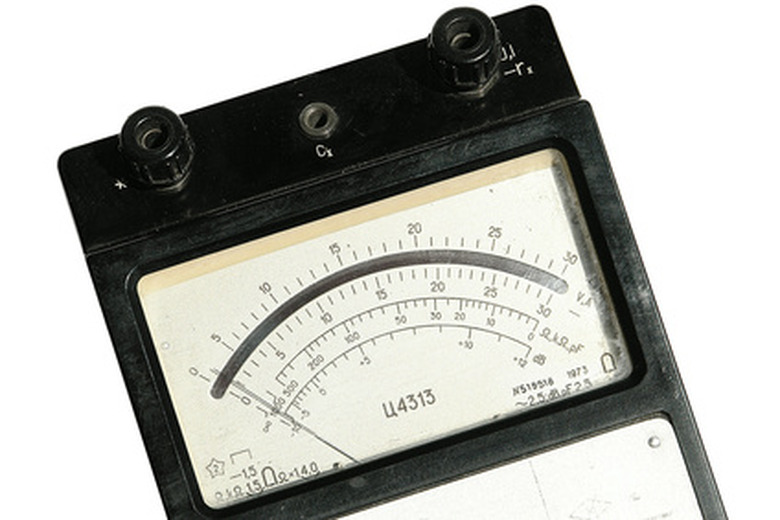The Disadvantages Of Analog Multimeters
Analog multimeters are the ones with the swinging needle. Digital multimeters are the ones with the digital readouts. Both measure volts, amps and ohms. Both have advantages and disadvantages. Analog multimeters are usually cheaper, quicker to respond and don't need batteries as long as you are not measuring ohms. Analog multimeters also have some serious disadvantages.
Accuracy
Accuracy
Accuracy is the most serious disadvantage of analog multimeters. There are three causes of error.
First, the mechanics of the device makes it inaccurate–the instructions that come with an analog multimeter suggest you set the scale so the needle registers on the right-hand side of the scale where the inaccuracy is only 1 or 2 percent. The inaccuracy increases as you move left across the scale.
Second, making mistakes when counting the marked graduations is easy, especially if your observation angle is off. You also must interpolate the last digit when the needle falls between two graduations.
Third, scales can introduce insidious inaccuracies. Being on the wrong scale–for example AC instead of DC–is the most obvious of these. In addition, for most measurements you must do a bit of mental arithmetic, and that is often a mistake waiting to happen. If the meter reads 4.7 and the scale is set to "times 10,000," this is pretty easy to do in your head, but this is also pretty easy to get wrong. A lax moment can lead to a big error.
Robustness
Robustness
The needle in an analog multimeter is activated by a magnetic field that causes it to rotate. You can damage this delicate by dropping the multimeter or simply using it for years. Making scaling mistakes or bad guesses can also "peg the meter," which is when the needle swings rapidly until it slams into the post at the end of the scale. Repeated pegging can damage the mechanism and make the multimeter inaccurate. The best way to avoid pegging the meter is to get into the habit of always starting on the highest scale and backing down until you get a good reading.
Advanced Features
Advanced Features
Analog multimeters respond to the electrical phenomena that they are measuring. They do not have the analytical power of digital electronics that is available in digital multimeters. Therefore, they will never have the features that top-of-the-line digital multimeters offer. These features include frequency measurements and waveform analysis. Choosing an analog multimeter means you are choosing not to have these features.
Cite This Article
MLA
Pick, Jo. "The Disadvantages Of Analog Multimeters" sciencing.com, https://www.sciencing.com/disadvantages-analog-multimeters-6878030/. 24 April 2017.
APA
Pick, Jo. (2017, April 24). The Disadvantages Of Analog Multimeters. sciencing.com. Retrieved from https://www.sciencing.com/disadvantages-analog-multimeters-6878030/
Chicago
Pick, Jo. The Disadvantages Of Analog Multimeters last modified March 24, 2022. https://www.sciencing.com/disadvantages-analog-multimeters-6878030/
